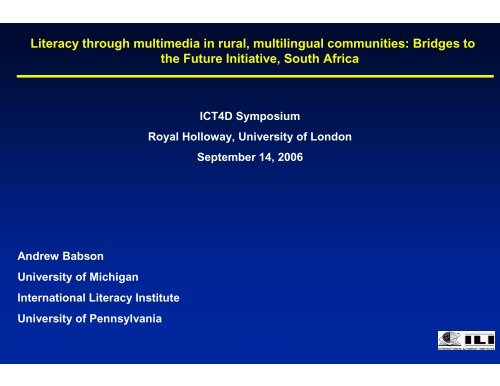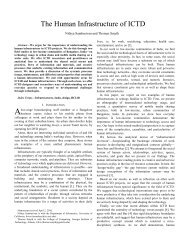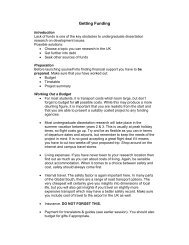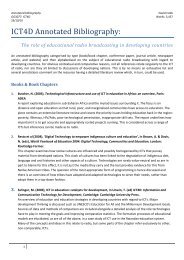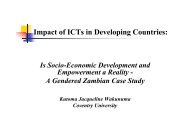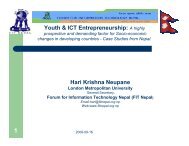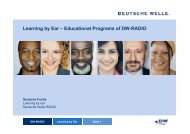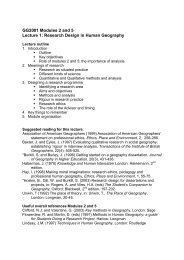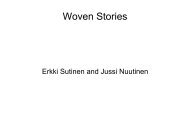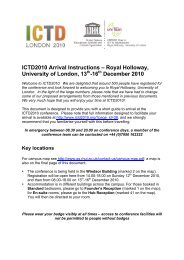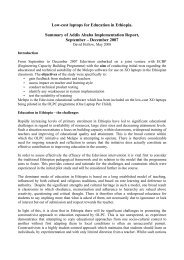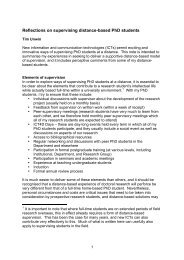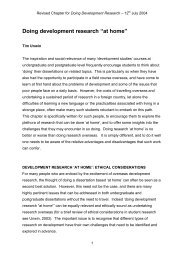Presentation Andrew Babson - Royal Holloway, University of London
Presentation Andrew Babson - Royal Holloway, University of London
Presentation Andrew Babson - Royal Holloway, University of London
You also want an ePaper? Increase the reach of your titles
YUMPU automatically turns print PDFs into web optimized ePapers that Google loves.
Literacy through multimedia in rural, multilingual communities: Bridges to<br />
the Future Initiative, South Africa<br />
ICT4D Symposium<br />
<strong>Royal</strong> <strong>Holloway</strong>, <strong>University</strong> <strong>of</strong> <strong>London</strong><br />
September 14, 2006<br />
<strong>Andrew</strong> <strong>Babson</strong><br />
<strong>University</strong> <strong>of</strong> Michigan<br />
International Literacy Institute<br />
<strong>University</strong> <strong>of</strong> Pennsylvania
Main points<br />
BFI goal: to research the benefits<br />
<strong>of</strong> ICT for literacy<br />
Personal research objective:<br />
research the potential success <strong>of</strong><br />
multimedia ICT applications for<br />
teaching multiple languages
The Digital Divide is really plural<br />
1. Access<br />
2. Connectivity<br />
3. Content<br />
4. Skills
Who are the Poor?<br />
Global Illiteracy and Technological Illiteracy<br />
Youth and Adult Illiteracy Rates<br />
(15 years and older, 2000)<br />
80<br />
70<br />
60<br />
50<br />
40<br />
30<br />
20<br />
10<br />
Traditional<br />
Illiteracy<br />
Technological<br />
Illiteracy<br />
<br />
<br />
<br />
Youth/adult literacy and technological<br />
literacy gaps are massive and<br />
growing<br />
Large inequalities by gender,<br />
ethnicity and language<br />
In Africa, more the half the population<br />
is illiterate or low-literate<br />
0<br />
OECD<br />
countries<br />
Africa<br />
Arab<br />
region<br />
Latin<br />
America<br />
East Asia<br />
& Oceania<br />
South<br />
Asia
Why consider new ICTs for education and health?<br />
Because… ICT-based tools can provide..<br />
second-chance education and motivation for out-<strong>of</strong>-school<br />
youth<br />
large increase in learning quality<br />
cost-effective culturally-relevant materials<br />
immediate productivity<br />
customizable & context-sensitive<br />
improved teacher training<br />
very low-cost scale up
Bridges to the Future Initiative (BFI)<br />
Three diverse<br />
countries: South<br />
Africa, Ghana, and<br />
India<br />
Main target groups: Out-<strong>of</strong>-school<br />
youth, reaching the most<br />
disadvantaged:<br />
<br />
Girls and women<br />
<br />
<br />
Ethnic and linguistic minorities<br />
Lowest income and unemployed<br />
BFI provides:<br />
<br />
<br />
<br />
Very low-cost hardware infrastructure<br />
based on underused ICT labs<br />
Multimedia materials in multiple (local)<br />
languages to support literacy and<br />
information access.<br />
In-service teacher training
BFI summary<br />
<br />
<br />
<br />
<br />
<br />
Access-only Digital Divide programs do little<br />
to address poverty reduction.<br />
The last three cranium inches count - Content<br />
is key<br />
IT tools must be consumer-oriented and<br />
context/culture sensitive, and must have<br />
learning at their core.<br />
Literacy and technology are becoming interdependent<br />
The Pro-Poor Challenge is…building bridges<br />
to the bottom half <strong>of</strong> the bottom half <strong>of</strong> the<br />
Digital Divide in developing countries.
Summer 2006<br />
Design process, Johannesburg<br />
target audience and creators- referential,<br />
cultural disconnect<br />
– field testing in local language<br />
– => joins together design and research<br />
processes
Summer 2006<br />
Research process<br />
<br />
Sample<br />
– - n for usability = 28, n for metacognition and survey<br />
questions =19<br />
– - 95% women<br />
– - range from 17 to 68<br />
– - 8 had never attended any school<br />
– - rural poor<br />
– - none had ever used a computer
Summer 2006<br />
Research process<br />
1. usability interviews (28)<br />
<br />
<br />
<br />
---task completion<br />
---evaluation<br />
*research note: detailed notes taken by interviewers <strong>of</strong> user<br />
behavior: sticking points, facilities, difficulties
Summer 2006<br />
Research process<br />
<br />
<br />
<br />
2. Language learning via ICT research<br />
- metacognition tasks<br />
– a) general b) <strong>of</strong> language learning<br />
Survey<br />
– part 1 - language<br />
• a) when and how how <strong>of</strong>ten do you speak which<br />
languages? why?<br />
• b) what work will it take for you to be completely fluent in<br />
English? Sepedi?<br />
• c) read these two newspapers. which is more interesting<br />
and why?<br />
• d) why do you want to learn how to read and write in your<br />
home language/mother tongue? English?
Summer 2006<br />
Research process<br />
<br />
<br />
2. Language learning via ICT research<br />
Survey (cont.)<br />
– part 2 - general education<br />
• a) what do you think ABET education will get you? what<br />
subjects will be most important?<br />
• b) why do you think education is important now? how does this<br />
opinion differ from when you were younger?<br />
– part 3 - ICT<br />
• a) who, to you, uses computers- and how do you think they use<br />
them?<br />
• b) if you are intersted in learning how to use a computer, why?<br />
• c) how long do you think it will take you to learn how to use a<br />
computer?
Summer 2006<br />
Research process<br />
<br />
Sample<br />
– - n for usability = 28, n for metacognition and survey<br />
questions =19<br />
– - 95% women<br />
– - range from 17 to 68<br />
– - 8 had never attended any school<br />
– - rural poor<br />
– - none had ever used a computer
Preliminary conclusions<br />
1. Education generally and/or English and/or computers =<br />
opportunity<br />
2. Sample tended to underestimate the time it would take to<br />
become literate in English (~1 year)<br />
3. Most had straightforward and concrete reasons for learning<br />
how to use a computer and how to read and write in Sepedi<br />
and English (e.g. for dealing better with banking issues),<br />
but this was supported by less concrete ideas linking<br />
literacy (espcially in English) and computer skills to<br />
personal improvement in terms <strong>of</strong> both character and<br />
material well-being.
Next Steps<br />
1. Continue design process in Johnannesburg<br />
2. Encourage design team to work more closely with field<br />
team<br />
3. Gather more data on:<br />
a) metacognition <strong>of</strong> language learning in a multi-lingual<br />
environment<br />
b) the ecological conditions <strong>of</strong> ICT literacy developmentlaptops,<br />
computer labs, ABET centers, community centers,<br />
etc.


